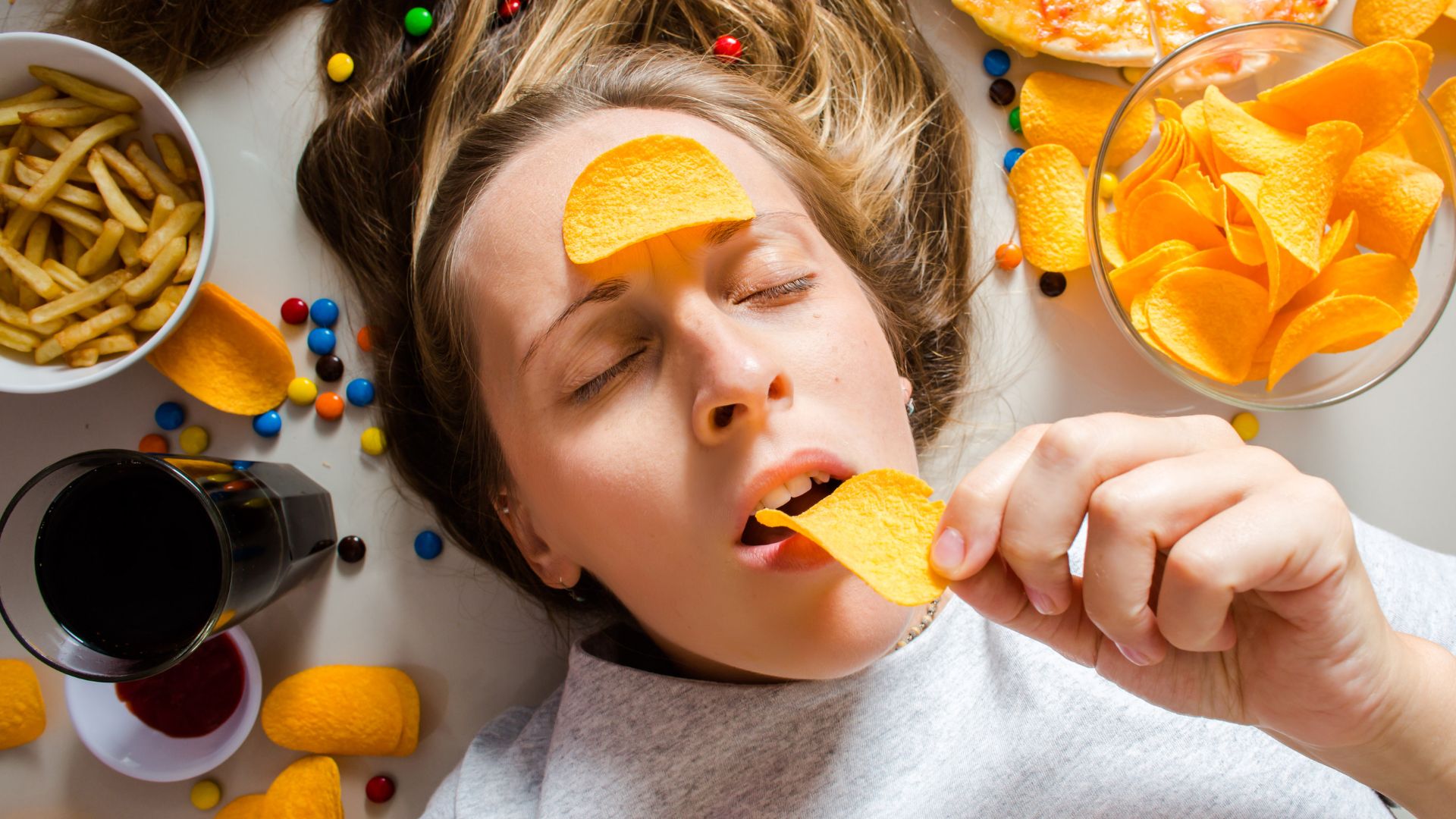Sign-Up For The NeuroGym Newsletter And Join The Innercise Revolution!
We value your privacy and would never spam you.
Featured
When times are hard, lots of us turn to food to start feeling better—and in the short term, some ice cream, chips, or chocolate can feel like an effective stress reliever.
But making a habit out of emotional eating becomes a big problem once the consequences of those bad food decisions catch up with you!
Food is everywhere in modern life, so it’s easy to unknowingly fall into this trap. It’s equally hard to get out of this bad habit given how ever-present snacks are during our day-to-day.

Luckily, there’s hope! We get ourselves into bad habits by reinforcing a negative behavior over time, but by using a little knowledge about how habits form in the brain, we can get ourselves out of bad habits the same way.
Wondering how emotional eating becomes a habit? Want to learn what neuroscience says about reinforcing healthy habits around food and coping with stress? You’ve come to the right place. Read on for the answers to these questions and more!
Want even MORE information on how to use neuroscience to take control of your health—and your success? Join us at this weekend’s live virtual training session—book your spot TODAY!
A messy breakup, an upcoming deadline, or a bad performance review at work—no matter what the source of stress, the negative emotions that come with it can be really hard to cope with.
Stress can also become overwhelming when we don’t have an easy escape from it—like if we’re working hours of overtime every day during a busy stretch at work or preparing for a big exam.
As animals, we’re biologically wired to like eating, especially foods that are high in fat, salt, or sugar—three essential nutrients that are in short supply in the wild where our instincts evolved! And since eating can make us feel better when we’re stressed, it’s easy to start using food as a coping mechanism.
The practice of using food to cope with emotions and stress is called emotional eating.
Today, we are constantly tempted with unhealthy food options. How long would it take you to get your hands on junk food if you started looking right now? Between packaged snacks filling store shelves and kitchen cupboards, delivery services like UberEats, vending machines, and fast food drive-throughs, it probably wouldn’t take long!
Convenience makes it super easy for emotional eating to become a habit. Running to the vending machine in the office lobby for a bag of chips when you’re stressed doesn’t seem like a big deal, until you realize you’ve been habitually eating chips in response to stress for months!
Many people who eat to cope with stress don’t realize they’re doing it. Thanks to the convenience of junk food, a stressed person can snack without really thinking about what they’re doing and why.
Emotional eating plays into our biology, but that doesn’t mean it’s impossible to overcome. It’s a habit like any other, and just like other habits, it can be kicked to the curb with a little training! Read on for some science-backed ways to change your habits around eating and stress.
The neuroscience of habit formation has been a previous topic on this blog, so we won’t go too deeply into it here. Just remember that our brains are plastic, and they form connections based on the behaviors we reinforce. These connections inform our wants, instincts, and cravings as we move through our day-to-day lives.
Here’s a quick rundown on how habits are formed. To make things clearer, we’ll link each step of the process to the example of “Suzy,” an analyst at a large corporate office. Suzy’s manager, Jim, is a very strict boss with very high standards, and Suzy finds keeping up with his expectations to be a major source of stress!
Habits are associated with triggers, which some neuroscientists call “cues.” When you consistently follow up a specific cue with a specific behavior, those connections become reinforced in your brain.
The next step of habit formation is the “routine.” This is the action that, once the habit becomes ingrained in the brain, is carried out on instinct.

Next, we have the “reward,” which is any kind of positive feedback that reinforces to your brain that the routine was a good response to the trigger. When your subconscious pushes you to act out a habit, that’s a sign your brain is looking for a specific reward.
From this, we can see how the habit of emotional eating can be hard to break. Indulging in ice cream has become an easy and convenient way for Suzy to cope with her stress, but it’s not healthy in the long run. When she noticed herself gaining weight and getting breakouts from too much sugar, Suzy realized it was time to make a change.
Skeptical about how working out your brain is just as important as working out your body when it comes to getting healthy? Come to this weekend’s live virtual training session to hear it from the experts. Reserve your spot NOW!
What’s the best advice we could give Suzy for finding a better way to cope with her work stress? Here are some evidence-based ways to break bad habits, and replace them with good ones!
Recognize the trigger. Habits are instinctual, and the reason they’re so hard to kick is that we don’t always realize why we act them out. In Suzy’s case, she examined her routine and realized she craved sweets after stressful interactions with her boss!
Choose an alternative coping method. Suzy decided that when she was feeling stressed after work, she’d do some relaxing yoga poses instead of grabbing ice cream. Here are some other examples of healthy ways to cope that don’t involve reaching for a snack:

Emotional eating is a hard habit to escape. We all live busy lives, and sometimes, those lives come with a lot of stress—a big presentation at work, an important exam, a family member’s illness, an unexpected financial problem, or whatever the case may be.
Emotional eating is reinforced in our brains just like any other habit, and as a result, we can overcome it with a little training. Using the science-backed methods above, you can stop eating emotionally by reinforcing positive habits to help you cope instead!
We’ll leave you with one last thought: If you regularly find yourself overwhelmed with stress or negative emotions, your coping mechanisms may not be the issue. You might be putting too much on yourself! While reinforcing positive habits for dealing with stress in the moment is great, you also need to take care of yourself in the long term.
We all want to stay busy, push forward, and achieve as much as possible, but you can’t pour from an empty cup. If you struggle to cope with stress, there’s no shame in taking a step back to recharge or calling a friend to talk. You’re more than just your work performance or career achievements, and you should never neglect self-care just to get more done!
Want to learn more about what neuroscience says about living a healthy life—in order to take full advantage of your incredible brainpower? Don’t wait: Sign up for this weekend’s virtual training session NOW!

NeuroGym Team: NeuroGym’s Team of experts consists of neuroscientists, researchers, and staff who are enthusiasts in their fields. The team is committed to making a difference in the lives of others by sharing the latest scientific findings to help you change your life by understanding and using the mindset, skill set and action set to change your brain.
We value your privacy and would never spam you.